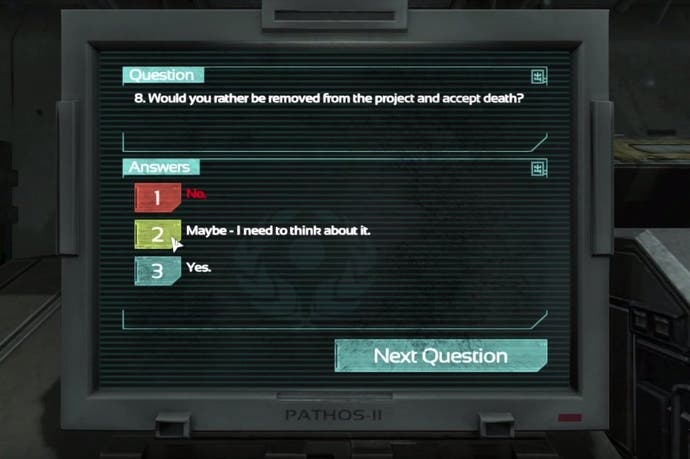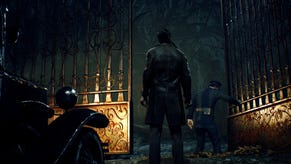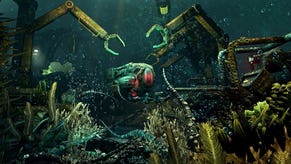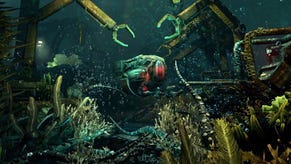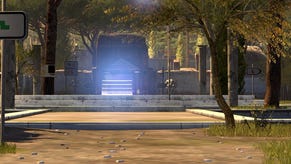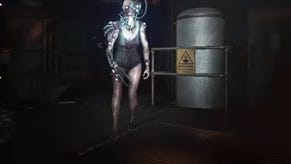Soma and the art of internal consequence
"How would you describe your mental condition?"
Your choices matter. This statement has been slightly reworded in the disclaimer of many a video game story. Recent Telltale titles, Until Dawn, Mass Effect, and David Cage games have gone out of their way to explain that you, the player, can influence the outcome of their narrative.
Soma, the latest sci-fi horror outing by Amnesia: The Dark Descent developer Frictional Games, tasks its players with making a series of moral and ethical decisions. Naturally, what you pick will have consequences. The difference with Soma, however, is that its consequences are entirely in your head.
And why wouldn't they be? In real life we make mistakes all the time that probably torture us more than the people we think we harmed. How often do we sit around obsessing about saying or doing the wrong thing, worried that we hurt somebody with our actions when in reality they didn't have nearly the importance we presumed? Ah, guilt, the tricksiest and most noble of internal demons!
Soma realises this. Its most impactful decisions, for me anyway, were in the form of a survey you're asked to fill out. Actually, you don't have to fill it out - as it's part of an offline random computer terminal found midway through the game - but you're going to complete it anyway because surveys are fun.
Here's the part where I get into mild spoiler territory for the first third of Soma:
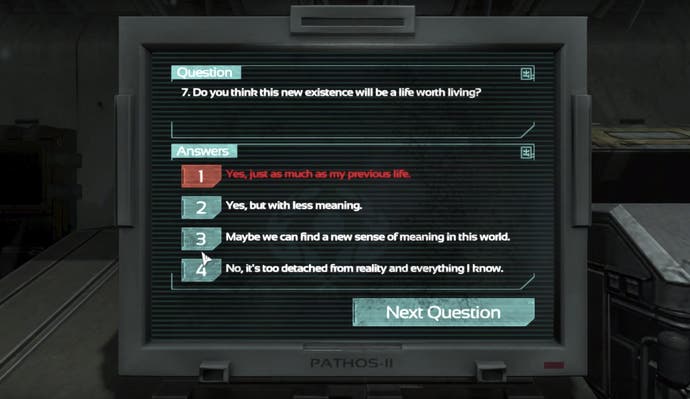
The questionnaire is asking test subjects, who are actually synthetic replicas of human consciousness uploaded into robot bodies, how they feel about no longer being strictly human. At this point in the story you've recently discovered that you're not who you think, but rather a digital replica of you with all the same memories and personality shoved into a machine sporting a diving suit. Humanity, as we know it, has been eradicated following a comet impact. It's a grim situation, that's for sure. So my answers reflected my bummed out emotional state.
"How would you describe your physical condition?" the survey asked.
"I feel alien - I'm a visitor inside another body," I answered.
"How would you describe your mental condition?"
"I feel disconnected - a separation of mind and body."
"How would you describe the sensation of your new condition?"
"Depressing - I can't shake the feeling of it all being fake."
"Do you think this new existence will be a life worth living?"
"No. It's too detached form reality and everything I know."
This survey in and of itself is a fantastic way of asking the player to really buy into the fiction. What would you do in this situation? How would you feel? As a spoiled 20th century human who enjoys physical contact with other humans, I found the idea of being robotic Frankenstein with an artificial brain to be a rather bleak position to be in. "Would you rather be removed from the project and accept death?" it finally asked.
"Maybe - I need to think about it," was my wishy-washy response.
End game spoilers next:

But then a funny things happened: at the end of the game you're asked to retake this survey in a very, very different situation after experiencing quite a lot in the past several hours. In the game's post-credits epilogue, you find yourself awakening in the ARK, a matrix-like digital reality where the last inorganic human brain scans can live out their days in a blissful Holodeck.
Mere moments before that I was scouring the bottom of the ocean floor with monstrous mutant fish and zombified husks of former men trying to bury me with them. In fact, a different version of me that didn't make it to the ARK is still down there, doomed to rot with the rest of the detritus. So this imaginative virtual paradise seems a lot more appealing than the horrific alternative I just spent the last dozen hours escaping from.
After surviving many death defying odds and subterranean terrors, I'm just happy to be alive. That I'm a digital consciousness in a fake world isn't so much an issue for me anymore. I pine for my days kicking it with my buds in Toronto, but this is much, much better than the ruinous wasteland of post comet earth. It's sunny, the trees are in bloom, and the one person I've befriended is rather easy on the eyes. (I reckon it's only human - or virtual human in this case - to consider these matters in the post-apocalypse.)
"Do you think this new existence will be a life worth living?"
"Yes, just as much as my previous life," I answer this time.
My responses mean nothing to the game's story beats (it's not like, going to set me up with another virtual human based on my answers), but my perception of events has changed a great deal. My choices don't matter to the story, but they matter to me. And what's happening in my head is my story. That's the whole theme of the game. It even opens with a Philip K. Dick quote: "Reality is that which, when you stop believing it, doesn't go away."
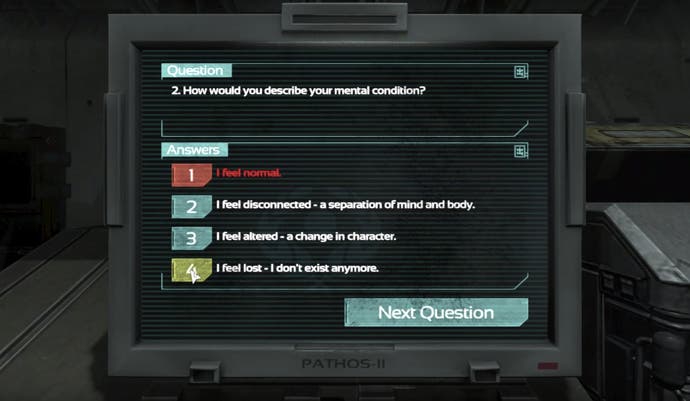
Soma has another couple of points like this. My favourite involves whether to mercy kill a previous version of you after you've copied yourself into a new body. This isn't just some clone either, but actually the person you were up until a few seconds ago. Killing yourself can't be easy, but neither can leaving them to awaken stranded in a decaying subterranean research station with no means of escape.
Again, this doesn't actually affect any story's outcome, but it hugely changes your own internal journey through his world.
Mattering to you versus mattering to the rest of the world is a fascinating theme that we butt heads with everyday in matters both large and small in the real world. Yet video games typically focus on only the latter half of this equation.
As much as I enjoy branching narratives in games like The Walking Dead, Until Dawn and Life is Strange, I'm still a big fan of the prescribed authored story. Games like The Last of Us and BioShock wouldn't work if we were simply given a way to change the main character's most personal actions, yet some folks find this sort of thing overly restrictive. I wouldn't say Soma's halfway meeting ground is always the optimal solution - as that's different for every project - but it's a smart one that's seldom employed. By the time the credits roll, Soma's protagonist Simon has gone through a complete character arch, while the player has gone through another. Did you change your mind about whether you wanted to live or not in the span of six hours? We humans can be so fickle like that.
